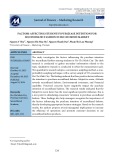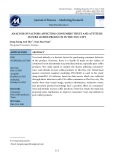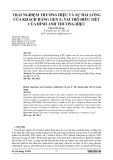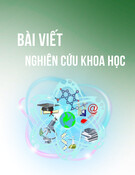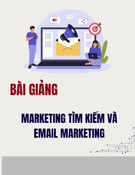
http://www.iaeme.com/IJM/index.asp 91 editor@iaeme.com
International Journal of Management (IJM)
Volume 8, Issue 3, May–June 2017, pp.91–96, Article ID: IJM_08_03_009
Available online at
http://www.iaeme.com/ijm/issues.asp?JType=IJM&VType=8&IType=3
Journal Impact Factor (2016): 8.1920 (Calculated by GISI) www.jifactor.com
ISSN Print: 0976-6502 and ISSN Online: 0976-6510
© IAEME Publication
MARKETING: PRACTICING THE ART OF
SCIENCE
Mithun S Ullal
SCEM, Adyar, Mangalore, India
ABSTRACT
Success is not an accident but an incident , an incident which is a summation of
hard work, perseverance and learning. Success in a dynamic industry of marketing is
mistaken to be an accident. Which leaves us at point of cross roads, one which leads
towards art and the other towards science. As to where should the bus of marketing be
going. The debate on whether marketing is an art or science here becomes inevitable.
The paper revisits the various schools of thought of arts and science to critically
analyse scientific realism, logical positivism, historic relativism and logical
empiricism. The paper analyses Marketing from the point of view to qualify it as art of
science. The paper proposes a general theory of marketing as Resource Advantage
Theory.
Key words: Resource Advantage Theory, Scientific realism, Logical positivism,
Historic relativism and Logical empiricism.
Cite this Article: Mithun S Ullal, Marketing: Practicing the Art of Science.
International Journal of Management, 8 (3), 2017, pp. 91–96.
http://www.iaeme.com/IJM/issues.asp?JType=IJM&VType=8&IType=3
1. INTRODUCTION
From the time marketing was born, practitioners have taken an insightful view on marketing
being an art or science and how could the current marketing thought constitute the theory for
the subject. An attempt at the theory of marketing was made as early as 1968 in
subcomponent theory, which is averse to hierarchical theory which is significant in the field
of science. A lot of researchers have argued that marketing is field of science, prominent
among them are Bartels (1951), Taylor (1965) Zinkhan and Hirschheim (1992) and
Kotler(1972). However researchers have argued that body of marketing disharmonize with
science as well. They are Alderson and Cox (1968) Anderson (1994) and Buzzell (1963).
Before we argue upon whether marketing is science, it’s crucial to establish what
embodies science. The research conducted on science has explained it as subjugated to
replication which strengthens the practitioner’s ability to explain, which can effectively be
controlled and adds to the existing tacit and explicit knowledge. Many criteria’s have been
postulated by researchers for a body to be called science. Important among them is the need
for the subject to be grounded on centralised theory and many other additional secondary
theories. Another criterion is the ability of the body of already existing classified knowledge

Mithun S Ullal
http://www.iaeme.com/IJM/index.asp 92 editor@iaeme.com
to unearth homogeneity and inconsistencies. This implies marketing to be a science. But
researchers who argue that marketing is not science point to the lack of a general theory.
However, a study of literature advocates that Resource Advantage Theory, may be accepted to
be the general theory which is based on competition.
The Resource Advantage theory borrows from the Austrian and Schumpeterian economics
( Hunt and Lambe, 2000). This theory describe the modern industry the light of the current
economy. It put forths the reasons for disparity among companies and brands competing in
the same segment (Hunt 1997). Origin of digression in product quality, innovation and
productivity (Hunt and Morgan 1997d). The type of competition (Hunt and Duhan, 2001).
How competition adds to the knowledge by analysis (Hunt 2000c).The attributes of
competition which is adaptable (Hunt and Duhan 2001) and the expansion of the national
economies (Hunt, 1995).
The theory takes a pragmatic approach towards the knowledge externalised to the
economists and the industries along with the marketing professionals (Hunt 1997a, 1997b).It
encloses the various types of the interchanges, costs and shared knowledge. RAT may be
taken as a theory that is general to marketing as it agrees to Hunt’s (1991) and Bartels’s
(1967) formula of what a general theory should be. According to Buzell, there need to be
certain qualities of a general theory. RAT satisfies that as it accurately predicts future market
happenings. Also RAT makes its findings crystal clear which allows it to qualify as a general
theory of marketing. Only Cavusgil, 1997 and Hodgson 2000 have thrown challenges at this
theory. Hence marketing qualifies as science where Resource Advantage Theory is considered
its central theory. The development of other theories which will compliment the marketing
science will develop from RAT.
2. MODERN DAY SCIENCE IS GUIDED BY THE FOLLOWING
SCHOOLS OF THOUGHTS
2.1. Logical Positivism
This theory advances approximately on the conviction of using verifactionism to calculate
how significant the declarations are. Words that attest logic acknowledges significance.
Insubstantial acknowledgements contemplate absurdness as they fall short of impartiality. The
theory holds that science is factual and asserts on correct computation and testing of
hypothesis.
This model favours causative tools of research. Verification theory forms the elementary
belief of this model. The thesis or hypothesis can be accurate if it can be factually reaffirmed
(Chalmers 1999). This basis constitutes difficulties for logical positive theory owing to
absence of aforesaid dictums as unquestioned veracity due to its impotence to substantiate it
factually. Subsequently, the logical theorist repudiated the verifiability basis and made
emendation to their theory to harbour liberal views for non factual discoveries.
Peter and Olson, 1983.
• Science observes the proper nature of truth.
• Science is independent of PEST (Political, Economic, Social and Technological) factors.
• It is non discriminatory.
• Knowledge is complete and progressive.
• It is adept at bringing out universal laws.
• Science generates theories that approach realism.
• Science is logical since it adopts rationality.

Marketing: Practicing the Art of Science
http://www.iaeme.com/IJM/index.asp 93 editor@iaeme.com
2.2. Scientific Realism
This theory argues that independent establishments submitted by scientific enquiry are the
actual establishments globally and the characteristics that are assigned to them approximated
by the scientific theories. The basis of argument of scientific realist is that scientific enquiry is
mainly theory free and this scientific enquiry can be done even when applicable phenomenon
is not observable. Simply put, Scientific Realism is good sense and sound judgement that
directs that scientific methods can be wrong and more importantly imprecise.
This theory rejects pragmatic philosophy syndicated in the rational positivism and the
theorisation of majority scientific judgment shares outline of empirical uniformity. Rrealism
assumes that scientific approach may be roughly right even though it could not reach a
conclusion from the known evidence. However the argument against this theory is that it lacks
the skill to illuminate the fast forward movement experienced by scientific knowledge during
the time of transformation (Chalmers 1999).
• Lakatos, 1977,1978
• Human creativity decides the path of science.
• The argument against this theory is by factual truths.
• Distinction of science from deceptive science is possible in realm of notions only.
• Knowledge of science is not complete.
• Development of science is by benefaction of facts by substitutes.
• Proposition depends on certainty or scientific conclusion in the context of research.
• Science develops with honesty.
• If the objective of science is fact, it must be stable.
2.3. Logical Empiricism
Logical positive theory conjunctures that science is impartial and places stress on painstaking
computation and hypothesis testing. Also relativism maintains intuitive and imaginative facets
of science. This theory lies in between two ends. According to this theory, scientific
advancement in any direction begins with immaculate scrutiny of actuality. The belief here is
to bestow the researcher with impression of actuality from where they can rationally initiate
priori model of process to be explored. Empirical testing of hypothesis attained from the
model should support the hypothesis on which corroborative illustrations are maintained.
Hypothesis that can grapple precise testing is confirmed to be authentic(Popper 1959). Here
science flourishes gathering numerous proclaiming examples acquired in a broad range of
situations and states(Anderson 1983).
The theory argues that all plans come from observation of facts. Comprehension of
actuality is mere general statements of specific exemplars. The general statements may not be
perfectly right. The theory argues that knowledge evolution is accompaniment exercise that
appears from agreeable proof of verifiable cognizance.
Hunt, 1983, 1991.
• Right description of verity is not certitude. Science attempts to know the real world.
• Practices of science advocates knowledge postulation to be independent of PEST.
• Exhaustive neutrality not feasible but science is effective in upholding its knowledge.
• Scientific knowledge is not complete but is complete.
• Science is lucid as it develops our grasp of the world.

Mithun S Ullal
http://www.iaeme.com/IJM/index.asp 94 editor@iaeme.com
2.4. Historic Relativism
The above school of thought believes that knowledge is better understood through patterns,
structures and theories. Kant’s analytical evaluation of cause developed this theory. Relativist
have put forward a suggestion that practical contact with actual state of things may deny entry
to empirical truths and theoretical constructs (Chalmers 1999). It is related to the conceptual
framework relativism. It is opposed to the thought that task of science was to simplify the
essence of science. It argues that scientific theory accepts cognitive relativism.
However, critics of Historical relativists have said that Historical Relativism is distant
from truth (Popper 1966). Also there is an argument put forward that historical relativist do
not give logical and consistent grounds for authentic, fundamental and systematic attributes of
scientific change.
Laudan, 1990, Peter, 1992
• Verity is created by science.
• Science is intuitive.
• Science is sociable can only be understood in its surroundings.
• Science is comparable.
• Science generates purpose that is situation independent.
• Facts are subjective to the context.
To establish different perspectives actuality, science is sighted as a mechanism by
relativism. Advocates of relativism maintain that the field of science intuitive. Hunt (1983,
1991) argues that scientific examination with relativist perspective is self contradictory. The
theory believes that science can only be deciphered in its surroundings. Empirical
investigation into theory construction is illogical as researchers generate and explain specifics
to grant accuracy to their conceptual claims. This makes empirical research invalid.
From the point of view of scientific realism, marketing cannot be called a science. A fully
fledged science should contain scientific programmes with additional theories (Lakatos 1978).
Marketing has a string of empirical adaption’s, no binding objectives nor continuity which
stops it from being called science. The scientific exploration in the marketing sphere is not
concerned with theory in fact finding and collection of data (Jacoby, 1978).Scientific
abstraction is preferably difficult to track in marketing ( Leone and Schultz, 1980). So from
the point of scientific realism, marketing as a science is at a developmental stage.
But from the positivist point of view, science has postulates that’s closer to reality.(Peter
and Olson 1983). It may not be right for marketing as it is concerned with locating and
comprehending facts than progression of complete rules from incident of facts (Peter and
Olson, 1983). Probably, significance on demonstrating rules and theorems may not expand
marketing subject. Importance given to statistics devoid of theory will leave us with
incoherent and useless things (Jacoby, 1978). Progress of theory is significant in scientific
enquiry of marketing; logical positivism may not be suitable analytical viewpoint.
Logical empiricist presumes that righteous science develops from researchers certifying
theories. The inspection of facts is succeeded by empirical testing. This increases the
likelihood of an incident obtained from a series of observation. The similarity to the truth of
the majority of marketing occurrences contributes logical empiricism as the best outlook for a
scientific enquiry. Thus, marketing may be central to the continuum.
The selection of historical perspective should be forecast on some basis. A philosophical
perspective must provide the following to the discipline (Hunt 1991):
a) Stimulate theory and methodological pluralism which curtails the chances of conceptual
short sightedness.

Marketing: Practicing the Art of Science
http://www.iaeme.com/IJM/index.asp 95 editor@iaeme.com
b) Provide a model for quality assessment of research programs and add to the promotion of
marketing as a science.
c) Recommend goals that impart effective scale for estimating possible research methods.
d) Explain the restoration of marketing science compatible with the present composition of
the subject.
On the lines of logical empiricism, ( Hunt 1991) argued that the main objective of science
is to construct theories to describe, forecast, comprehend and control the event. Science
should have clear subject characteristics, collection of facts which acts as a director for
exploration. Finding the hidden equalities between these events produces factual uniformity,
principles and theories. By these events, science gives understanding of the society by
construction of generalisation regulating the societies behaviour. (Chalmers 1999)
Hunt (1983) identifies marketing as behavioural science trying to demonstrate exchange
relationships between the customer and marketer. According to Hunt 1) Customers show
behaviours that complete exchanges. 2) Marketers show behaviours that complete exchanges.
3) Organisational structure exhibits behaviour that complete exchanges. 4) The behaviour of
completing exchanges among customer, marketer and organization impacts society.
Hunt(1983) explains the directing research requirements related to principles 1) What
makes a consumer buy a product at a particular place and decide on when he buys and how he
buys. 2) What are the reasons marketers select a particular price, place and promotion. 3) The
reasons behind an organisation choosing a particular marketing function to complete
exchanges and what will be the outcome 4) What is the impact of customers, marketers and
organisations behaviour on the market.
These questions will be influential on the researcher guide to inspect association in
marketing environment. Also, the theory which is a outcome of the above questions must
meet the criteria of specification adequacy, sufficiency of characteristics used in
categorization, Mutual exclusiveness of categories, combined exhaustiveness of category, and
Utility to the marketing community set by Hunt (1991).
Logical empiricism identifies the base of understanding in experience and the foundation
of science in experiment and observation( Kuhn 1962). These theorists argue that all the
understanding starts from observation, which leads to empirical generalisation amid
observable things (Hunt 1991). By following logical empiricism researchers can take up
varied marketing concepts and find empirical basis for them for the purpose of generalisation.
According to Hunt (1990, 1991) empirical knowledge is prone to errors and a rational
verifiable knowledge can be attained by observation. Even though, evidence is required to
reinforce the contention that illustrative knowledge adds to the facts which helps decision
making (Hunt 1991).
In the area of marketing, instinctive hypothesis are developed or by the procedure of
elucidation ( Hunt 1991). These models can be tested empirically. The model which passes
repeated test, it can be confirmed to become a theory (Popper 1959). On being confirmed as a
theory, it is used to derive other additional theories. It will have to overcome infrequent
problems but will continue as a theory until proof is provided disproving it. The RAT theory
for example is challenged but the proof opposing the theory in insufficient. However, if the
proof is sufficient, a new theory will be emerging (Kuhn 1962). In the field of marketing,
knowledge comes from observation leading theory which gives meaning to observation. In
agreement with Bagozzi (1984), science and knowledge will show an upward trend beginning
with information to premise for understanding. So, by logical empiricism, scientific interview
in marketing by experimentation, inspection and training may result in developing the
discipline. The logical empiricism may direct the scientific enquiry in marketing (Hunt 1983,

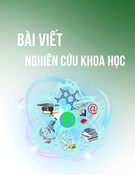

![Cẩm nang Mỹ thuật và kỹ thuật ứng dụng trong marketing [Chuẩn SEO]](https://cdn.tailieu.vn/images/document/thumbnail/2025/20250714/vijiraiya/135x160/224_cam-nang-my-thuat-va-ky-thuat-ung-dung-trong-marketing.jpg)



